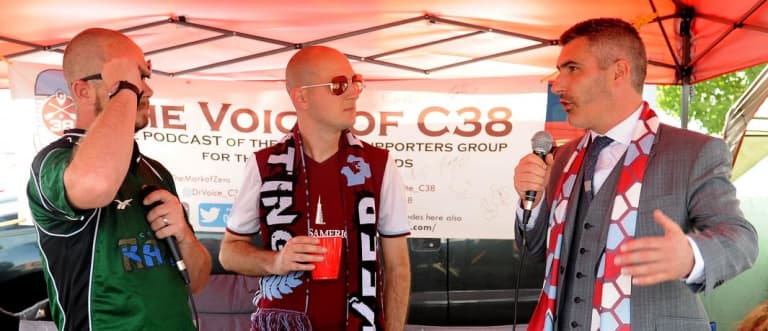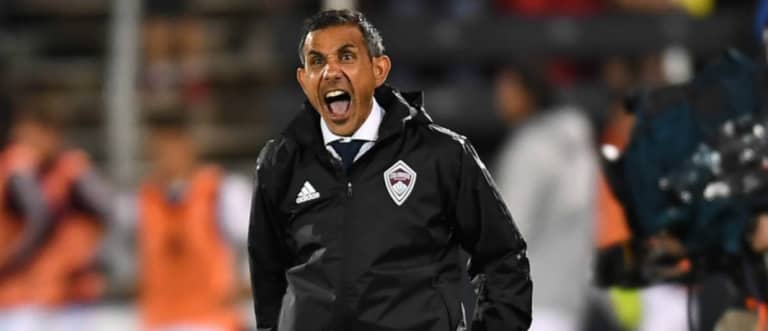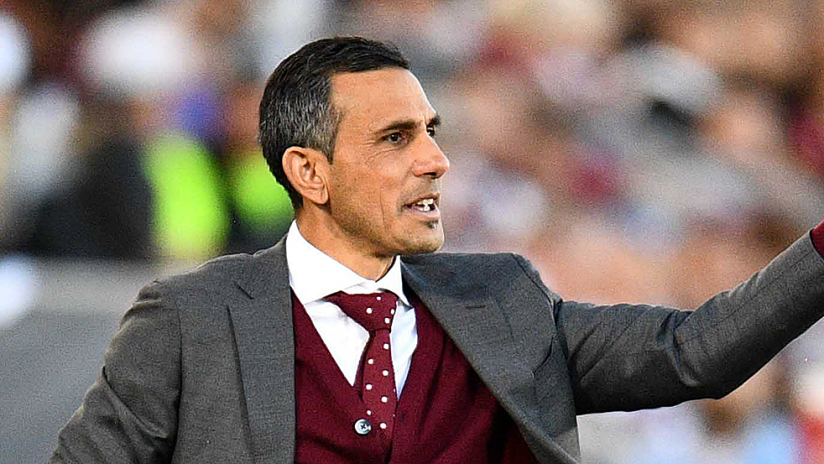There’s not much consolation to take out of a home loss to the league’s last-place club, but Colorado Rapids sporting director and interim GM Padraig Smith likely left Dick’s Sporting Goods Park after Saturday's 1-0 defeat to D.C. United feeling like his team had made at least a little bit of progress.
Smith and the Rapids dismissed former head coach Pablo Mastroeni last week, firing the club legend nine months after they inked him to a new, three-year contract following Colorado’s shocking second-place finish in the 2016 Supporters’ Shield race.
These sorts of decisions are always driven by results, and Colorado weren’t getting them under Mastroeni. After overachieving for the entire 2016 season, the Rapids have seriously regressed this year, going 6-12-4 in 22 matches before changing coaches.
But it wasn’t just a poor record that drove Smith (pictured at right below) and Rapids interim chief business officer Wayne Brant to axe the man most synonymous with their club. According to Smith, there was a bit of a philosophical difference, too.

Even as the Rapids were riding Mastroeni’s defensive approach to the second-best record in the league last year, the club’s front office was itching for a more attacking style of play. Smith said that they made clear prior to the start of the year that they expected to become less conservative and more forward-facing in 2017.
With that transition failing to take hold under Mastroeni, Colorado – who’ve scored just 22 goals this year, second-worst in MLS – decided to make a change.
“We were always clear even during the course of last season that a transition was needed and this year we wanted to see progress in that regard,” Smith told MLSsoccer.com on Friday evening.
“There was no doubt that we felt that a regression toward the mean was inevitable on the defensive side – it’s very hard to be historically great year in, year out. But we knew that it was going to be necessary to put more emphasis on the attacking side. We don’t feel like we achieved that. We feel like that wasn’t being affected, so that’s ultimately what led to the change.”
The coaching switch didn’t lead to a result on Saturday, but the Rapids did at least look dangerous against D.C. Interim head coach Steve Cooke ditched the 4-2-3-1 and 4-4-2 used regularly under Mastroeni to line up in a 4-3-3, and Colorado responded by creating more chances than they have just about all year.

They hit the woodwork twice, forced Bill Hamid into several fine saves and finished with 18 shots, their second-best total of the season. They didn’t score, but that was due to poor finishing, not a lack of opportunities.
Cooke’s task is to build on that performance in Colorado’s final 11 matches. A member of the Rapids technical staff since 2010 and a first-team assistant since 2013, the Englishman will have a shot at the full-time job this winter. He’ll have competition, however, with Smith saying that Colorado will conduct a “global, comprehensive” search for their next head man.
Smith said his ideal candidate will share the Rapids’ ideas about become more of an attacking outfit. He wants a manager who “looks for creative talent” and “gives players the freedom in the attacking phase of play to take calculated risks.”
The interim GM also understands that in order for Colorado to become not just an attacking team, but a successful one, he’ll have to acquire different players. Mastroeni’s approach was undeniably defensive, but it was also somewhat pragmatic, something Smith acknowledged.
One could easily argue that defending deep and looking to break on the counter was the best approach given Colorado’s level of offensive firepower. Mastroeni could’ve opened things up further, but, as seen on Saturday, that wouldn’t have guaranteed results.
“We need to become a more attacking unit, we need to have a more attacking mindset and therefore we’re going to target players that we feel fit in with that,” Smith said. “Players who play with a boldness and sense of urgency, intensity, high soccer IQ, good game intelligence, quick players with explosive movements, players that share the same desire to win that Wayne and I do.

“That’s really important. We don’t want to lose sight of what’s made us good in the past, but we want to make sure that we’re a more balanced, well-rounded team and that means that we have to improve on the attacking side.”
They should soon have some room to make additions. Smith said that the club is nearing a resolution to get Designated Player-in absentia Juan Ramirez off their books, and that they hope to be able to make an announcement sometime this week. Ramirez recorded just one goal and three assists in 27 appearances in 2015 before being loaned out each of the last two years. Smith didn’t provide details on what form that resolution would take, but confirmed that it would open up a DP spot for 2018.
Colorado did make an attacking addition late in the summer transfer window, adding 30-year-old winger Stefan Aigner using Targeted Allocation Money. Smith is hopeful the German, who carved out a good deal of success in the Bundesliga, will provide a boost to the Rapids down the stretch. His arrival won’t turn the Rapids into an attacking juggernaut, however. That’ll take a good deal of time and, more than likely, a good deal of money.
We’ll see if Smith and Colorado can pull it off.
“As we move forward now, we’re very conscious of the fact that this won’t happen overnight,” Smith said. “But it is very important that you see progress and you see steps in the right direction right from the beginning.”













